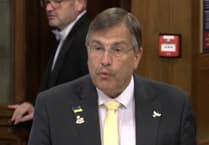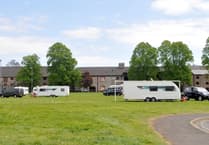Nearly 250 Roman coins found on a farm in Denbury have been described at a treasure trove inquest as 'the find of a lifetime'.
Historian Geoff Fox, of Newton Abbot, along with Sean Pitts, also of Newton Abbot, stumbled upon the hoard in April 2007 while combing the land with metal detectors.
Mr Fox told the inquest in Torquay on Tuesday how, within 30 minutes of searching, the pair received signals which led them to the coins buried between one inch to 1ft deep. 'Right away I knew them to be Roman,' said Mr Fox. 'It's quite rare to find such coins.'
After this initial discovery, the pair returned to the field the next month and found further riches. It was confirmed at the inquest that the total gathered was 243 coins.
It was their third foray on to the farmland, which is owned by Jack Isaac. The inquest nearly 250 Roman coins found on a farm in Denbury have been described at a treasure trove inquest as 'the find of a lifetime'.
Historian Geoff Fox, of Newton Abbot, along with Sean Pitts, also of Newton Abbot, stumbled upon the hoard in April 2007 while combing the land with metal detectors.
Mr Fox told the inquest in Torquay on Tuesday how, within 30 minutes of searching, the pair received signals which led them to the coins buried between one inch to 1ft deep.
'Right away I knew them to be Roman,' said Mr Fox. 'It's quite rare to find such coins.'
After this initial discovery, the pair returned to the field the next month and found further riches. It was confirmed at the inquest that the total gathered was 243 coins.
It was their third foray on to the farmland, which is owned by Jack Isaac. The inquestheard how Mr Isaac had agreed to the pair searching for treasure in his fields.
Assessment by the British Museum revealed the discovery was of copper alloy Roman coins, some dating back to around 328 AD.
The hoard was examined by Sam Moorhead, a leading authority on Roman coins, who confirmed that – due to their age and precious metal content – the finding qualified as treasure.
Local archaeologist Danielle Wooton, who attended the inquest, said that, while the monetary value of the coins was low, their archaeological worth was enormous.
She was thrilled by the find, the furthest south west discovery of its kind, saying that some of the coins dated back to the time when the Roman Empire was crumbling (around 370 AD).
'It's really important that people using metal detectors keep coming to us with their finds. These discoveries are changing the way we view archaeology in Devon,' she said.
Mr Fox has been spurred on to keep on searching for treasure with his metal detector. 'I love history and this is a great way to find history – it's a great hobby,' he said.
He hopes coins will go to a local museum.
Further riches, found in a Denbury field, were also revealed in a separate inquest on Tuesday.
In November 2006, Stuart Hunt and Phillip Higginson, both of Newton Abbot, and David Martin, of Exeter, unearthed seven Bronze Age copper bun ingots.
The trio were members of a metal detector club in Torquay whose members had been given permission by the owner of the land, Kiernan Wellwood, to scour the field.
The inquest heard that the items, with an average weight of around 500 grammes, were found about four inches below the surface.
After inspection by the British Museum, the bun ingots were said to date back to between 1100 and 800BC.
Ben Roberts, the museum's curator of Bronze Age finds, confirmed that due to their age and precious metal content the items qualified as treasure.
Ms Wooton said it was probable that the bun ingots had been hoarded by people who aimed to return later to smelt them.
She said that there was little monetary value attached to the finds, although she was again 'excited' by the discovery.
The bun ingots have been donated to the Royal Albert Memorial Museum, Exeter.




